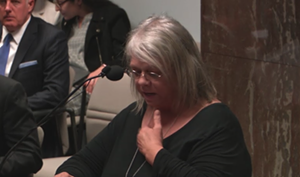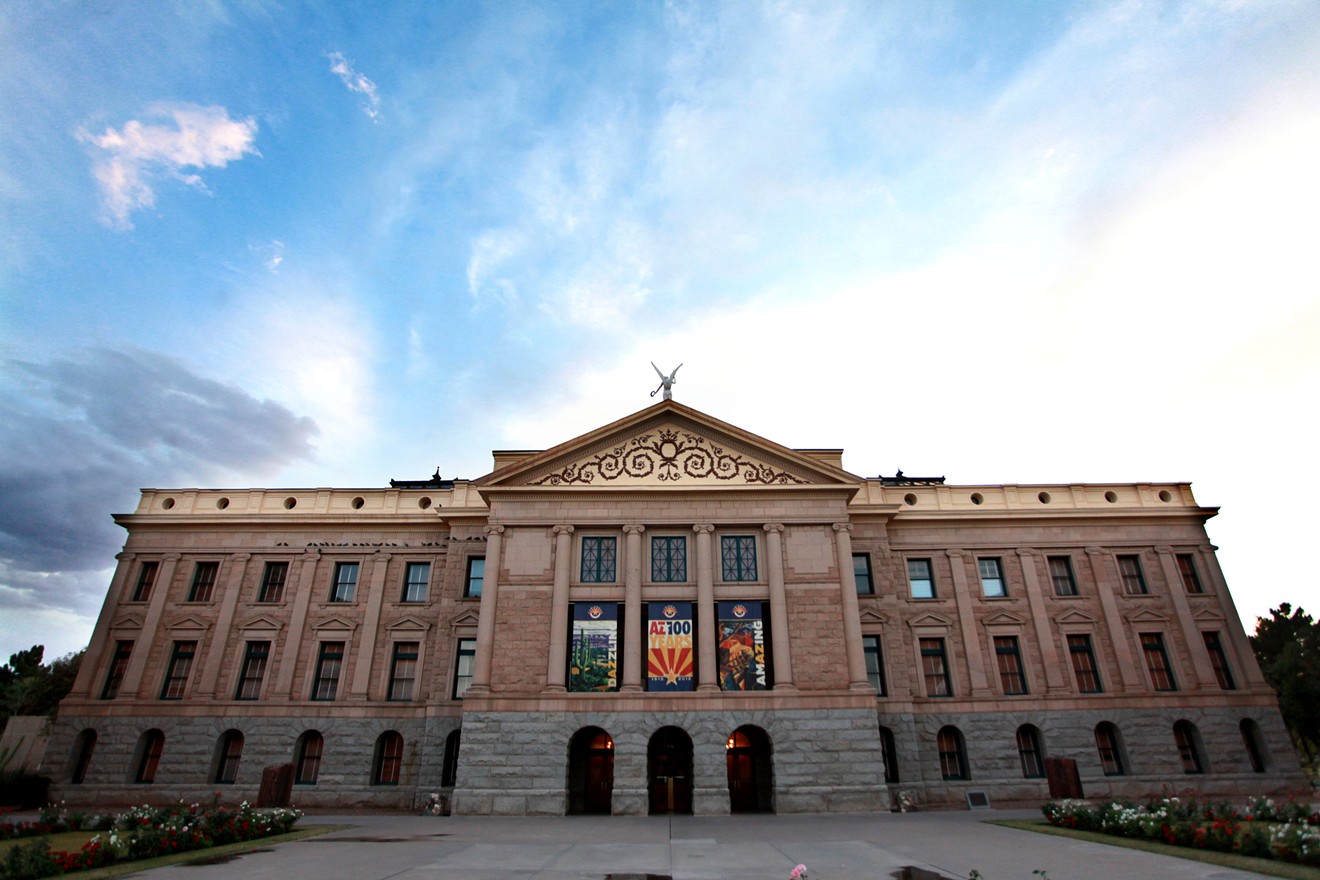At the age of 12, Schuster informed her mother that she would never return to that uncle’s house, citing the abuse. Schuster's mother told her never to lie like that again, she said. Schuster closed her mind to what had happened and concentrated on graduating from high school.
In later years, she confronted family members, including the uncle, hoping for answers. She was repeatedly dismissed. The uncle’s ex-wife said he never would have done anything to hurt Schuster. The uncle himself told Schuster that he had done no wrong, that he had done nothing Schuster didn’t want, she remembered.
The trauma from those memories has never fully faded. “You’re never really done,” Schuster said. “It took years and years of therapy to put me in a stable place.” She is now 60, and she works as an advocate for survivors and victims of sexual abuse, running support groups and educational seminars.
Recently, part of her work has included advocacy at the Arizona Legislature, where a showdown is looming this week over the question of how much time the law should give survivors of childhood sexual assault to sue their abusers or institutions that allowed the abuse.

Annette Schuster testifies before the Arizona House Appropriations Committee on April 4, 2019.
Arizona House of Representatives
But Republican leaders in the Legislature have blocked both of those bills, SB 1255 and SB 1101, from being heard or voted on in committee. In February, Senator Eddie Farnsworth, chair of the Senate Judiciary Committee, didn’t allow a hearing on SB 1255. In April, Representative Regina Cobb, the House Appropriations Committee chair, allowed a discussion, not a vote, on SB 1101.
Republicans in both chambers are preparing to introduce budget bills on Monday, but Boyer has vowed not to vote for a budget unless one of his survivor bills is heard. Fellow Republican Senator Heather Carter has sided with Boyer, leaving the 30-member Senate, with its 17 Republicans, without a working majority.
“All I want is an up or down vote. I’m not asking for a lot here,” Boyer said. “But at least give me an opportunity to make the case.”
In an apparent effort to pre-empt a deadlock, House Speaker Rusty Bowers, a Republican from Mesa, on Thursday introduced a different bill, HB 2746, to extend the statute of limitations for victims of childhood sexual assault. House members had to suspend rules for the bill to be introduced so late in the session.
In a statement, Boyer roundly rejected that bill, calling it “a cynical bill not worthy of this legislative body.”

Arizona House Speaker Rusty Bowers during the opening session of the Legislature, January 14, 2019.
Elizabeth Whitman
As of Friday, Boyer said he was still trying to set up a meeting with Bowers. “They tell me he’s really busy on budget ... and they would get back to me if he’s free,” Boyer said. He said he had also asked fellow Republican Senator J.D. Mesnard to broker a meeting with Senate President Karen Fann and Carter. He was “still waiting” to hear back on that, too.
Meanwhile, HB 2746 has been assigned to the House Rules Committee, where no testimony is taken, and so victims and survivors will not be able to weigh on legislation that deeply affects them.
“Yet again, Republicans are silencing victims of childhood sexual assault,” Boyer said.
In an email, House Republican spokesperson Matt Specht painted Bowers’ bill as a practical move.
"Most of Senator Boyer’s bill has widespread support in the Legislature, but his insistence on getting everything he wants was preventing an important policy change that will give victims more time to file claims against their abusers," he said.
"Given Senator Boyer’s refusal to compromise, Speaker Bowers didn’t see any purpose in trying to negotiate with him and instead focused on crafting language that has broad support in the Legislature," Specht added.
Boyer rebuffed those criticisms, saying, "This really isn’t about me. It’s about getting justice for victims and making sure current or future children are not harmed." He said his bills did have sufficient support from legislators — leaders were simply blocking them from going to the floor for a vote.
Advocates and experts, many of them survivors of sexual abuse themselves, say that the bill Bowers introduced lacks the elements contained in Boyer’s proposals that are essential to giving survivors a path to justice.
Bowers’ bill would give survivors until the age of 30 to file a civil suit. The bills Boyer is pushing would give them either seven years from the time they disclose the abuse to a professional (SB 1255) or until the age of 25, along with a one- or two-year period known as a revival window that would allow time-barred survivors to file suit (SB 1101, a strike-all amendment).“Yet again, Republicans are silencing victims of childhood sexual assault.” — State Senator Paul Boyer
tweet this
The median age for a survivor to disclose abuse is 48, and up to one-third of survivors will never say anything at all, according to Child USA, an academic think tank at the University of Pennsylvania. The organization advocates for the type of revival window contained in SB 1101, on the basis that bringing in survivors excluded from the legal system can expose hidden abusers.
“It is a medical fact that victims of child sex abuse often need decades to come forward,” wrote Marci Hamilton, Child USA's founder and a professor at the University of Pennsylvania, in a letter in January supporting a bill in New York state to expand the statute of limitations there and create a one-year revival window. “It is in society’s interest to have sex abuse survivors identify hidden child predators to the public — whenever the survivor is ready.”
New York Governor Andrew Cuomo signed that bill into law in February, adding New York to the handful of states have enacted these retroactive windows. After Delaware created a two-year window in 2007, more than 1,100 lawsuits were filed. Settlements with the Wilmington Archdiocese resulted in not just financial compensation for victims but also access to church records naming known abusers.
In Arizona, advocates say they are perplexed as to why House and Senate leaders seem bent on protecting organizations, like insurance companies and religious institutions, that could be held liable in civil actions, by blocking bills that would retroactively allow lawsuits. To them, leaders have prioritized greedy industries and institutions over people who have endured some of life’s worst cruelties.
“Why are they more concerned about these companies?” Schuster wanted to know. “What’s happening to the victims is, they’re continuing to be victimized,” she said.
The most public opposition to Boyer’s bills is the Mutual Insurance Corporation of Arizona, which covers doctors and other medical professionals. It has not yet taken a stance on Bowers' HB 2746, but its lobbyist, Mike Low, viewed the bill as “an improvement” over Boyer’s bills.
Low said he had no problem with extending the statute of limitations to the age of 30. Rather, he objected to two aspects of HB 2746: its revival of time-barred claims until the age of 30, and the use of the word “negligent,” in stating that someone could sue for damages over abuse resulting from “another person’s negligent or intentional act.”
“I also don’t like the use of that term: 'negligence.' I think that’s too open-ended. They should strike that and insert ‘knowingly,’” Low said."As kids, our little brains aren't meant to process those things, so we shut 'em down. It's normal, until it's not normal anymore." — Annette Schuster
tweet this
“That term, ‘negligence,’ to me, is an invitation for abuse,” he added.
“The insurance industry prices things based on what they know,” Low said. “Based on claims history. Based on statutes of limitations. It creates a real issue when all of a sudden, a statute of limitations they thought existed no longer exists.”
He said he was “perplexed” as to why survivors should be allowed to revive claims. “It seems to me, you had the right to file a lawsuit, and for whatever reason, you chose not to,” Low added.
When someone is abused as a child, recognizing and understanding that fact can take years, decades — if it happens at all.
"As kids, our little brains aren't meant to process those things, so we shut 'em down," Schuster said. "It's normal, until it's not normal anymore." And when survivors do start to understand what happened to them, the last thing they typically want to do is wade into the legal process, she said.
Schuster never filed a civil suit against her uncle. Nor did she pursue criminal charges. In all of the support groups she's run for survivors over the past 15 years, she said she knew of one person who had sought criminal charges against their abuser. None had ever filed civil claims.
"I still think the majority of people are not going to file civil suits," Schuster said. "But they should have the right to."
For the most part, the Catholic Church, which has lobbied fiercely against similar legislation in states like Pennsylvania, has kept a low profile in the Arizona debate.

Republican State Senator Paul Boyer has sponsored two bills this session to extend the civil statute of limitations for childhood victims of sexual abuse.
Elizabeth Whitman
"We've not been directly working legislators hard on this issue," he told New Times, saying that he’d “had conversations with people” behind the scenes and “in passing.” He declined to say with whom.
At least one prominent elected leader, who happens to be Catholic, has also tried discreetly to weigh in on one of those bills. In April, Maricopa County Attorney Bill Mongtomery sent a string of text messages to Boyer in which Montgomery appeared to question the revival window in SB 1101, AZ Family reported after obtaining those messages through public records requests.
In a statement to New Times last week, Montgomery said, “I have never lobbied for or against any bill seeking to extend Arizona’s statute of limitations for bringing forth a civil claim involving this type of offensive conduct.”
On Friday, after Bowers introduced HB 2746, Montgomery said he wouldn’t advocate for any one version of the legislation, adding, “Whichever proposal is able to garner the necessary support to broaden the statute of limitations for sexual assault victims is fine by me.”












